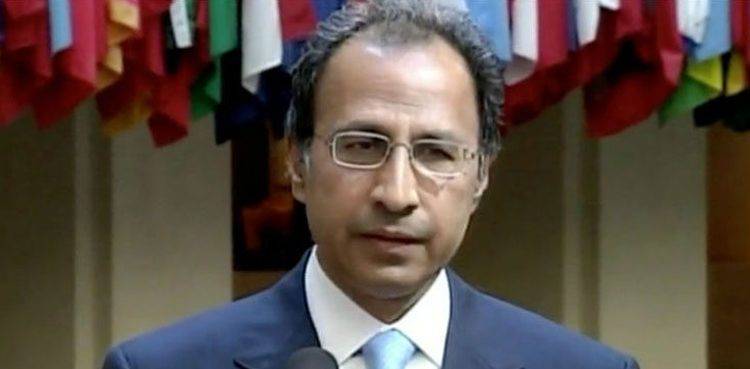
ISLAMABAD: The Pakistan Tehreek-e-Insaf (PTI) government on Wednesday gave a go-ahead for initiating the privitisation process of one dozen state-owned enterprises, including two power distribution companies while also approving the transaction structure for strategic sale of two LNG-fired power plants.
The two LNG-fired power plants that are owned by the government-controlled National Power Parks Management Company Limited (NPPMCL) are expected to attract around Rs300 billion in non-tax revenues.
The government is looking to conclude the privitisation of these power plants in the ongoing fiscal year to meet some fiscal targets.
The Cabinet Committee on Privatisation (CCOP) decided to privatise the Islamabad Electric Supply Company (IESCO) and Lahore Electric Supply Company (LESCO) due to lack of assistance from the Power Division.
CCOP Chairman Dr Abdul Hafeez Shaikh warned the power ministry for not cooperating with the government to push forward its agenda of privatising the unprofitable state enterprises. He asked the ministry either to cooperate in the privatisation of power distribution companies or inform the prime minister about its reservations at the earliest.
Meanwhile, the meeting approved the inclusion of State Life Insurance Corporation (SLIC) along with IESCO and part of LESCO in the active list of privatisation programme, read a statement issued by the finance ministry.
The statement further said that a proposal for delisting Telephone Industries of Pakistan (TIP) from the privatisation programme was also brought under consideration and later approved keeping in view the Ministry of Information Technology and Telecommunication’s plan to revive TIP through a joint venture. The process has already been initiated in consultation with TIP employees and the Privatisation Commission.
It merits mention here that the privatisation of power distribution companies was not a part of the federal budget. The prime minister’s energy task force had also proposed restructuring of the entities first before putting them up for privitisation.
The task force had recommended privitising the power sector companies in the third year of the PTI government only if the issues of circular debt could be addressed by that time.
However, after assuming office, Shaikh increased the number of entities on the privatisation list from seven to 20.
The incumbent government has taken Rs200 billion worth of loans by pledging their assets and is also cross-subsidising power consumers in different cities, which can create problems for the process of listing these companies on the stock market.
A State Bank of Pakistan (SBP) report showed that the debt of public sector enterprises (PSEs) increased 47 per cent to Rs2.1 trillion within one year that ended on June 30.
The CCOP also approved a hybrid option for the privatisation of National Power Parks Management Company Limited (NPPMCL) comprising two LNG-based power plants namely 1,223-megawatt Balloki power plant and 1,230MW Haveli Bahadur Shah power plant. It instructed the Privatisation Commission to complete the bidding process by the end of December 2019.
The finance adviser said on Sunday the government expected to earn Rs300 billion from the privatisation of the two LNG power plants. The Rs300 billion privatisation proceeds will be critical to achieve the over-ambitious primary budget deficit target of Rs276 billion.
The two LNG-fired power plants that are owned by the government-controlled National Power Parks Management Company Limited (NPPMCL) are expected to attract around Rs300 billion in non-tax revenues.
The government is looking to conclude the privitisation of these power plants in the ongoing fiscal year to meet some fiscal targets.
The Cabinet Committee on Privatisation (CCOP) decided to privatise the Islamabad Electric Supply Company (IESCO) and Lahore Electric Supply Company (LESCO) due to lack of assistance from the Power Division.
CCOP Chairman Dr Abdul Hafeez Shaikh warned the power ministry for not cooperating with the government to push forward its agenda of privatising the unprofitable state enterprises. He asked the ministry either to cooperate in the privatisation of power distribution companies or inform the prime minister about its reservations at the earliest.
Meanwhile, the meeting approved the inclusion of State Life Insurance Corporation (SLIC) along with IESCO and part of LESCO in the active list of privatisation programme, read a statement issued by the finance ministry.
The statement further said that a proposal for delisting Telephone Industries of Pakistan (TIP) from the privatisation programme was also brought under consideration and later approved keeping in view the Ministry of Information Technology and Telecommunication’s plan to revive TIP through a joint venture. The process has already been initiated in consultation with TIP employees and the Privatisation Commission.
It merits mention here that the privatisation of power distribution companies was not a part of the federal budget. The prime minister’s energy task force had also proposed restructuring of the entities first before putting them up for privitisation.
The task force had recommended privitising the power sector companies in the third year of the PTI government only if the issues of circular debt could be addressed by that time.
However, after assuming office, Shaikh increased the number of entities on the privatisation list from seven to 20.
The incumbent government has taken Rs200 billion worth of loans by pledging their assets and is also cross-subsidising power consumers in different cities, which can create problems for the process of listing these companies on the stock market.
A State Bank of Pakistan (SBP) report showed that the debt of public sector enterprises (PSEs) increased 47 per cent to Rs2.1 trillion within one year that ended on June 30.
The CCOP also approved a hybrid option for the privatisation of National Power Parks Management Company Limited (NPPMCL) comprising two LNG-based power plants namely 1,223-megawatt Balloki power plant and 1,230MW Haveli Bahadur Shah power plant. It instructed the Privatisation Commission to complete the bidding process by the end of December 2019.
The finance adviser said on Sunday the government expected to earn Rs300 billion from the privatisation of the two LNG power plants. The Rs300 billion privatisation proceeds will be critical to achieve the over-ambitious primary budget deficit target of Rs276 billion.
